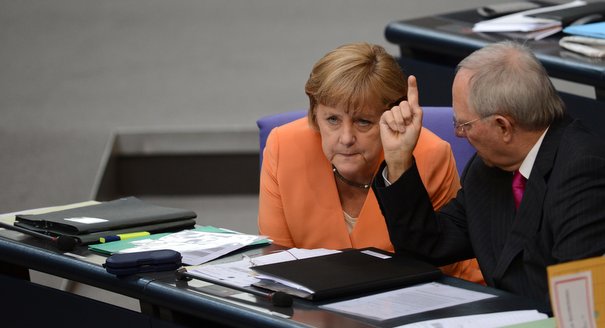As European leadership prepares for the sixteenth EU-India Summit, both sides must reckon with trade-offs in order to secure a mutually beneficial Free Trade Agreement.
Dinakar Peri
{
"authors": [
"Judy Dempsey"
],
"type": "commentary",
"blog": "Strategic Europe",
"centerAffiliationAll": "",
"centers": [
"Carnegie Endowment for International Peace",
"Carnegie Europe"
],
"collections": [],
"englishNewsletterAll": "",
"nonEnglishNewsletterAll": "",
"primaryCenter": "Carnegie Europe",
"programAffiliation": "",
"programs": [],
"projects": [],
"regions": [
"Europe"
],
"topics": [
"Climate Change",
"EU"
]
}
If given the chance, Germans would vote against giving more powers to Brussels. Then what would happen to Europe?
It is no fun coming back from holiday and facing more political problems.
But that is what happening to Chancellor Angela Merkel this week.
When she was away, the genie was let out of the bottle. An astonishing number of German leaders from across the political spectrum are calling for a referendum on Europe.
Among them was finance minister Wolfgang Schauble from Merkel’s own party. Schauble is a passionate European, but that was not what inspired his call for a referendum.
Schauble spoke out because he—and many other members of the Berlin political establishment—are terribly afraid of what is going to happen on September 12.
That is when the Constitutional Court in Karlsruhe will give its ruling on whether Germany may ratify the Fiscal Pact Merkel negotiated with her EU partners, and whether it may contribute to the bail out mechanism of the European Stability Mechanism.
German constitutional lawyers warn that both laws entail such a radical transfer of budget powers to Brussels that this may violate the German constitution as it stands now.
In other words, from the German legal and constitutional perspective, integration has reached its limit. Further integration is out of the question unless the German constitution is changed. For that to happen, a referendum would be needed in which the citizens, for the first time, could have a say about Europe.
Just say if things would really happen that way. What if there was a referendum called on a much closer Union? How would Germans vote?
If more political and economic integration means ceding more national powers to Brussels, the guess is that Germans would oppose it, for several reasons.
First, a political, economic and fiscal Union in Europe would mean that Germany would have to pay more. On the one side, there would be shared liability for debts, on the other side, there would probably be additional transfers to poorer countries. For both, Germans would have to pay extra.
Second, the German experience over Greece has been dreadful. The day is coming closer when the German taxpayer will be asked to cough up billions to cover the guarantees made to keep Greece afloat. In the meantime, Athens has come through on precious few of the promised reforms.
Third, there is the issue of weak leadership in Brussels. The EU, including the Commission, has made a hash of dealing with the euro crisis. It lacks clout and courage as well as accountability and democratic controls.
Merkel herself is not blameless in this matter. It was she, along with France, who did a stitch up over reappointing Commission president Jose-Manuel Barroso in 2009 because they hoped he and the Commission would be malleable.
But the problem started much earlier. Eight years ago, under the leadership of Romano Prodi, the Commission simply scolded German and French leaders when they breached the rules for keeping their budget deficits under 3% of gross domestic product, as stipulated by the EU’s stability pact. Also, it let Greece get away with falsifying statistics and not implementing reforms.
So, sweeping changes would be needed over how the Commission, the Council, and the European Parliament were elected before Germans would be willing to hand over more power to Brussels. But such a process would take at least three to five years, even optimists admit. And it is by no means certain that other countries’ parliaments or citizens would vote in favor, either.
Resolving the euro crisis, then, should not be held hostage to waiting for more integration, particularly when Europe is facing its worst political and economic crisis since World War Two.
National governments, especially the German one with Merkel at its helm, need to find solutions to the euro crisis that do not entail a lengthy, difficult, and chancy process of rewriting the EU treaties. Perhaps that may entail letting Greece go bankrupt. Certainly, it means a more orderly process of dealing with countries’ debts.
The longer governments refuse to face this, the deeper they dig their own hole. Integration is for another time.
Carnegie does not take institutional positions on public policy issues; the views represented herein are those of the author(s) and do not necessarily reflect the views of Carnegie, its staff, or its trustees.
As European leadership prepares for the sixteenth EU-India Summit, both sides must reckon with trade-offs in order to secure a mutually beneficial Free Trade Agreement.

Dinakar Peri
The hyper-personalized new version of global sphere-of-influence politics that Donald Trump wants will fail, as it did for Russia. In the meantime, Europe must still deal with a disruptive former ally determined to break the rules.

Thomas de Waal
2026 has started in crisis, as the actions of unpredictable leaders shape an increasingly volatile global environment. To shift from crisis response to strategic foresight, what under-the-radar issues should the EU prepare for in the coming year?

Thomas de Waal
A renewal of relations between France and Turkey is vital to strengthen European strategic autonomy. To make this détente a reality, Paris and Ankara should move beyond personal friction and jointly engage with questions of Black Sea security.

Romain Le Quiniou
Europe is designing a new model of collective security that no longer relies on the United States. For this effort to succeed, solidarity between member states that have different threat perceptions is vital.

Erik Jones